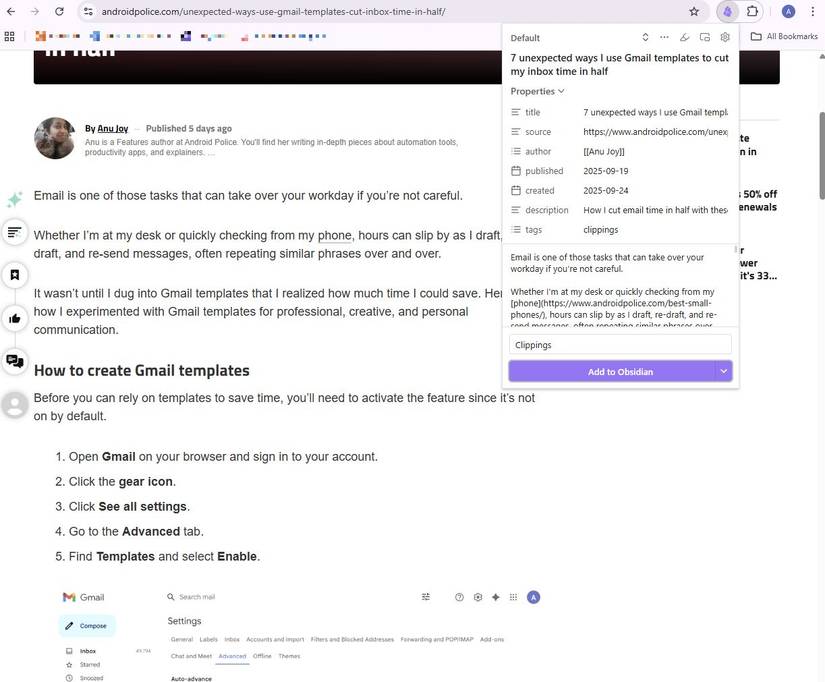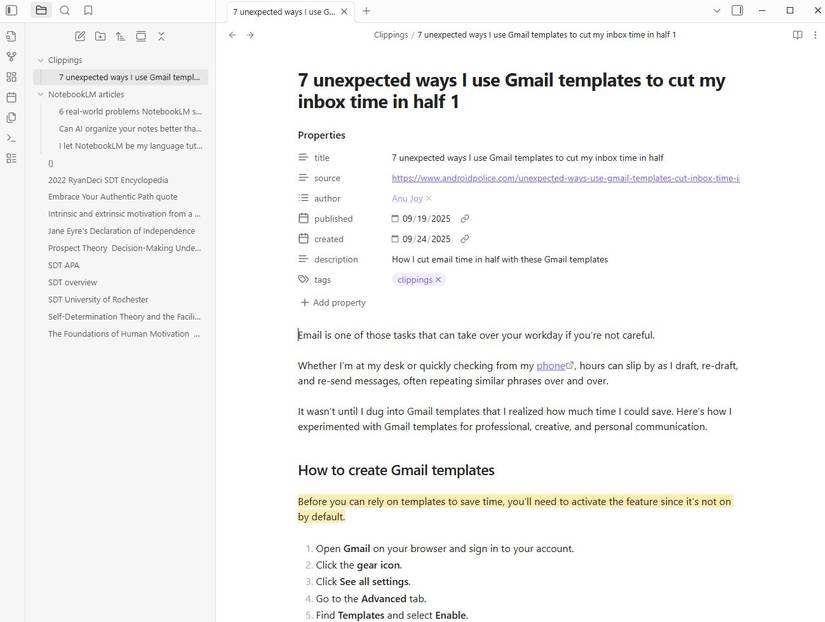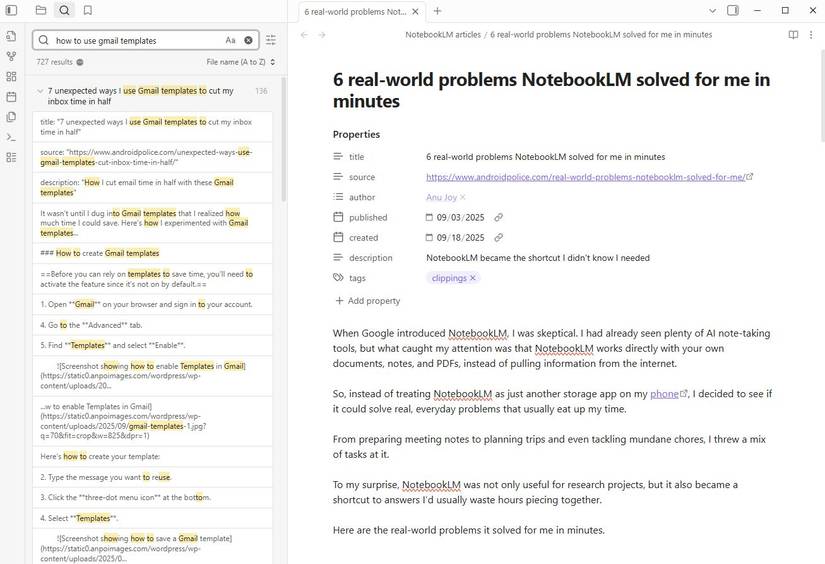When Mozilla announced it was shutting down Pocket, I expected my carefully saved reading list to unravel.
Pocket was my catch-all inbox for articles, research, and tutorials. I also used the app on my phone to save stray links I wanted to revisit later.
But instead of scrambling for a new service, I switched to Obsidian Web Clipper, a free Chrome extension I’d already been testing.
This lightweight tool saves pages straight into my Obsidian vault, alongside my notes and ideas. The best part was that there was no risk of losing my library when a company changes course.
Here’s how the switch worked and the few settings that make Obsidian Web Clipper a perfect long-term replacement for anyone who relies on a system for managing reading materials.
What is Obsidian Web Clipper?
Save web pages straight to your Obsidian vault
Obsidian Web Clipper is a free Chrome extension that lets you save any web page directly into your Obsidian vault, the same place where you can store all your notes, ideas, and research.
Instead of juggling a separate app or worrying about syncing, every article or snippet you clip becomes a Markdown file inside your existing Obsidian setup.
To get started, you must install the Obsidian Web Clipper extension from the Chrome Web Store.
When you find something worth keeping, click the extension’s icon, add optional tags or highlights, and click Add to Obsidian. The page is instantly converted into a clean Markdown, ready for linking and organizing alongside your other notes.
Because it’s tied to Obsidian, the clipper fits neatly into a broader knowledge-management workflow. You can connect clippings to related notes, search everything in one place, and keep your data entirely local if you prefer.
My reading list is under my control
I can save articles with ease
After moving to Obsidian Web Clipper, there is a sense of ownership over my reading list. With Pocket, my articles existed in the cloud, under Mozilla’s control.
Even though I could save and tag them, I was ultimately dependent on a service that could change rules, go offline, or, as we now know, shut down entirely.
Now, every clipping is stored directly in my Obsidian vault. I decide how it is organized, tagged, and linked. Nothing is subject to a third party’s policies.
The best part is that I can search and reference these articles exactly how I want, integrating them into my broader knowledge base.
Customize saved articles in Obsidian
Clipping is flexible
One of the things I immediately appreciated about Obsidian Web Clipper is its adaptability.
Unlike tools like Pocket that force every saved article into a fixed format, this extension lets me decide how each clipping fits into my vault. I can choose the folder, add tags, and highlight or annotate before saving.
Every page becomes a Markdown file that I can link to other notes, integrate into ongoing projects, or store for later reference.
Tags and metadata make retrieval effortless
Organizing notes, simplified
When I save an article using Obsidian Web Clipper, I can add multiple tags, a custom title, or even notes about the article.
Because every clipping is a Markdown file in my vault, I can later filter by tags, search for keywords, or follow links to related notes. Finding a specific article from months ago is no longer a scavenger hunt.
The trade-offs (and why they’re worth it)
There are a few compromises
Switching to Obsidian Web Clipper hasn’t been all smooth sailing.
Unlike Pocket, there’s no dedicated mobile app with automatic syncing. On mobile, the only way to clip articles directly into Obsidian is to use a browser that supports extensions, like Firefox, and use the Obsidian Web Clipper extension.
The interface is also a bit less polished compared to Pocket’s streamlined design. For quick browsing and casual reading, it can feel more hands-on than the “save and forget” simplicity I was used to.
That said, the trade-offs are more than worth it. Every clipping is stored locally, and I have complete freedom over its organization.
Obsidian Web Clipper has become a welcome upgrade for my workflow
Switching from Pocket to Obsidian Web Clipper feels like an upgrade. Despite a few trade-offs, like the lack of a dedicated mobile app, the benefits far outweigh the minor inconveniences.
The flexibility of clipping, the power of tags and metadata, and the peace of mind that comes with owning my content completely transformed my reading workflow.
For anyone frustrated by Pocket’s closure, Obsidian Web Clipper is a worthy alternative.






… [Trackback]
[…] Read More on on that Topic: geeksforgeeks.org/pocket-s-shutdown-didn-t-hurt-my-workflow-thanks-to-this-free-chrome-extension/ […]
… [Trackback]
[…] There you can find 76694 more Info on that Topic: geeksforgeeks.org/pocket-s-shutdown-didn-t-hurt-my-workflow-thanks-to-this-free-chrome-extension/ […]